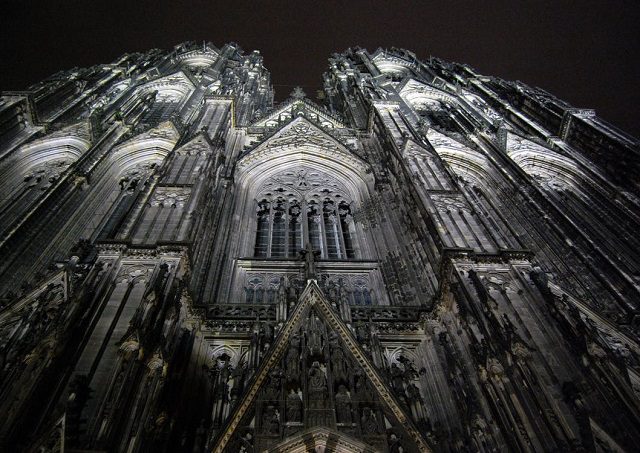
Cologne Cathedral, Germany. Photograph by Vasil Kunchev (7-27-09) [Pexels.com / CC0 license]
***
(5-1-99)
***
This is a transcript of a May 1, 1999 interview via telephone with Dick Kelley (his words are in blue), host for a Connecticut Catholic apologetics television show called Pillar of Truth (my black-and-white mug shot appeared on the screen :-). The host and the studio crew liked my presentation on development of doctrine so much that they asked me if I would be willing to immediately tape a second show – this time without any prepared notes – truly “off the cuff” and ad lib. I said yes and the result was the following, which lasted about 25 minutes. I had no idea what I was going to be asked. The subjects covered were:
Mary (as the Second Eve)
Christian Authority and Private Judgment
The Eucharist, and Why Protestants Dislike the Real Presence
Martin Luther’s “Catholic” Beliefs
Matter and Spirit in Protestantism
Sola Scriptura vs. Development and Tradition
Nominal, Lukewarm Catholics
You are a convert to the Catholic faith. And coming from evangelicalism, there are a lot of issues to deal with. Did [for example, the doctrine of] Mary give you some problems?
Not as much as you might think. With most Protestants that’s probably the issue. I don’t know why that is, except that I just had really good [informed] Catholic friends. We were having group discussions at the time, and I would ask them about Mary, because it fascinated me. And my friend John McAlpine started telling me about the idea of the New Eve, or Second Eve, which is a motif in the Fathers. And this was pretty much a totally new idea to me at the time. It had never occurred to me; I had never thought about it in that way, but it fascinated me, because it is fundamentally biblical. It’s an analogy whereby Eve was disobedient: she said “no” to God, in effect. Then Mary comes along and she says “yes – I will bear God in the flesh.” So that begins redemption history in terms of Christ and the Incarnation. In effect it reverses the “no” of Eve. That’s the notion of the Second Eve, which is really the basis of all later Mariology. From that you go to sinlessness, Mother of God, perpetual virgin, and so forth. That probably broke down whatever prejudice I had against it.
How about the priesthood?
No, not really. That wasn’t an issue, because I believed in authority of some sort. I just didn’t understand the nature of Catholic authority. When you’re an evangelical, it’s basically – the stereotype is – “me, the Bible, and the Holy Spirit.” And in practice that boils down to “whatever my opinion is.” We could rationalize away just about anything. I would hope that I didn’t do that, but that’s the tendency of human nature, when you bring in private judgment. And being Americans, in particular: we never had a king, and that sort of thing. So we’re not accustomed to submitting to authority. That’s considered “un-American.” I think that enters into it, too. People think that the Catholic Church is “un-American,” because then you’re subject to a pope who’s in Rome. There’s a lot of different factors. I’m interested in history of ideas, and epistemology (how people arrive at what they believe). And with this issue, I’m convinced that there are a lot of secondary factors and influences that predispose someone to accept or reject an idea.
That’s right; yeah. I’m big on that, myself. I call it the “Americanization of the gospel.” We seem to have taken the teachings of Jesus and tried to make it fit our “fast food” American lifestyle . . . I know that one of the issues that seems to be a big hangup for most evangelicals who are considering conversion to the Catholic faith is the Eucharist. Did you have any trouble with that at all?
Yeah, that was difficult for me to accept the literalness of it. Because – again – Protestants are more or less trained to put everything in the realm of spirit. I think there is some influence here of the ancient heresies of gnosticism and Docetism, which regarded matter as evil. Some of that has penetrated into Protestantism. They’re inclined to think that a symbolic Eucharist is more “spiritual” than an actual one. That’s where it’s a radical departure from all of Church history. Even Luther believed in the Real Presence, and he was so passionate about it that he would say that people like Zwingli (who didn’t believe it) were “damned” and “out of the Church.” And that’s a direct quote. He had some pretty choice words to say [chuckle]. The point is that Luther accepted the Real Presence; he accepted baptismal regeneration; he even believed in the Immaculate Conception (if Protestants think I am exaggerating, that can be documented from Lutheran sources). So he had a very Catholic Mariology, that’s been lost. It’s really with John Calvin that present-day Protestantism begins in all its essentials.
In your conversion story, you had said that you were quite a fan of Martin Luther.
Oh yeah.
I believe you said he was your hero at one point. And you studied the man’s life and his beliefs and his teachings quite a bit. And it is surprising, I think, for most Protestants to learn that what we Catholics believe today, Martin Luther believed. What part of the Eucharist was it that gave you the most difficulty? Was there anything in particular, or just the whole concept itself?
I just thought that it was . . . I guess most Protestants would say “why is that necessary? Why can’t you just have a remembrance?” There’s a sense in which they think it’s more messy or that it’s not necessary. They have an aversion to matter. I really think it goes back to the matter vs. spirit thing, because you see that in Protestantism; like the stereotypes of the fundamentalists: they’re against music and dancing – anything that involves physical pleasure, pretty much. You can’t drink. There’s wine in the Bible . . . Drunkenness is wrong. But just drinking alcohol – that’s not biblical [to forbid it]. But yet, I think they believe that because they have an insufficient notion of the human body and human beings – that pleasure is part of God’s creation.
What was it, then, that convinced you of the authenticity of what the Catholic Church said about the Eucharist?
Unlike many converts, I didn’t really work through every doctrine. A lot of my friends [who later converted] would be studying these doctrines for months, and they’d try to find it from the Bible, but that’s still a Protestant methodology. I believe that these doctrines can be defended from Scripture – and that’s the whole theme of my website. But they don’t have to be explicit in Scripture. And of course sola Scriptura isn’t either. I don’t think you can find that in Scripture. So I didn’t do that, so much as I changed my view as to the nature of what the Church is, and the nature of authority. Development was the key to that, because it showed me that the Catholic Church did have a consistent principle all through the 2000 years, that it wasn’t just arbitrary – what’s called oftentimes “the late inventions of the Catholic Church.” [chuckle]
Just a couple days ago I had a man who has a Ph.D and a Master’s in Theology (I don’t know what denomination) write to me and say “what do you think of Pius IX just inventing the Immaculate Conception, with no biblical evidence or anything?” That’s how he viewed that. It’s so simplistic and absurd, and coming from someone that educated, it really shows the mindset, that they have no inkling whatsoever of development or the “sense of the faithful,” as Newman talks about.
They must think that the pope couldn’t sleep at night or something, and stayed up one night and just decided to invent some sort of a new doctrine.
[tongue-in-cheek] He had a demonic vision and then he decided to . . .
Yeah, and then came out the next day and proclaimed it to the world. On your website you can find the whole history of all of these things, through all of the links. You can trace these things all the way back and find out that there’s a lot more to it than just some pope coming out some day and saying, “hey, guess what? Mary was immaculately conceived.” You can find the discussion in the early Church and so on.
We have a difference in the Catholic and Protestant Bibles. Is that right?
Yeah. We have seven more books.
Did you have any difficulty with that at all, when you were converting to the Catholic faith?
Not particularly. I read a few of those books, like Tobit. But I studied a little bit about it after I converted.
If you can accept the authority of the Church and the pope, as they are presented in Scripture, then for the most part, although some doctrines are hard to understand . . . once you can take everything on the authority of the Church and the pope, you’re almost home.
Then the charge is, of course, “well, you’re just throwing away your mind.”
Oh boy! You know, I’ve never used my mind so much!
[laughter]
Honest! Until I was challenged on these doctrines, . . . that’s when your mind goes to work.
Exactly, and we get challenged a lot, don’t we?
Oh, absolutely. But if the deity of Jesus Christ had never been challenged, the Council of Nicaea would have no reason to come up with what we call the Nicene Creed. It’s the challenges that clarify what we believe, and of course every Council that’s ever been called has always been in response to some challenge somewhere.
How do you as a convert, coming into the Catholic Church, and many of our Catholic brothers and sisters are accused of being, um, not as full of vim and vinegar; they don’t seem to have this excitement about them. How do you deal with that? Do you sometimes look around in the Mass, for example, and say, “boy, I wish everybody had the fire that I feel”?
Well, I don’t always feel fire myself. [laughter] In terms of keeping the fire, I go back to Scripture again, where you didn’t have a situation with a bunch of perfect saints. If you read what Paul said to the Galatians and even the Romans; if you read about the seven churches in Revelation — that was Jesus talking to them. They had a host of problems. Paul talks about the Corinthians. I think there was incest going on there, immorality, drunkenness, debauchery. It sounds a lot like today! [chuckle] Nothing really changes. So that’s another myth that has to fall upon close examination: the early Church was not perfect; we’re not perfect today. God never promised that. What He promised was infallibility and indefectibility of doctrine. So even popes are not perfect saints. We do have saints, too, but it’s a different question from the nature of the true Church.
It’s always been the same. I use the analogy of, “you say that our popes are sinners. Well, what about the Bible writers?” You have Moses and David, who killed people; David committed adultery. Paul persecuted Christians. God used them [and the Bible was infallible despite their imperfections]. Peter betrayed Christ. But all these people were used in tremendous ways. They weren’t perfect.
David, thank you again for your participation on the program. Keep up the good work on your website.
Thanks. It was my pleasure. God bless.













